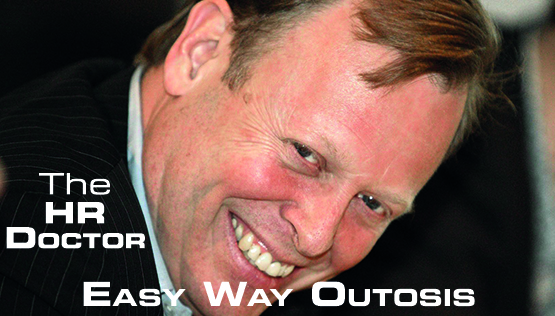 10.08.2020
10.08.2020
The HR Doctor 6:
Easy Way Outosis
Af Nick Holley, Associate Director of Learning, Corporate Research Forum
|
Nick Holley er Keynote på Træfpunkt HR 2020 online, hvor han deler ud af sine diagnoser over de 10 ”sygdomme”, som han har set HR lide af i de 30 år, han har fungeret som praktiker, researcher, underviser og konsulent. Kan du genkende dem? Som optakt til Keynoten sætter vi fokus på de 10 sygdomme i ugerne op til Træfpunkt HR. |
I work with an organisation called Strategic Dimensions that recruits senior HRDs. It’s found a great opening question at interviews is to ask ‘why did you go into HR?’. If the answer is ‘because I like people’ then they finish the interview (The best answer was ‘because it pays better than social work’) because it indicates they don’t have a business centric view but a people centric view of HR, which isn’t what CEOs are looking for.
Symptoms
- HR is timid, driven by the need to be liked as opposed to respected. HR lives for the crumbs of appreciation and recognition that ‘real’ business people sometimes drop from the top table.
- HR avoids conflict, never says no or challenges.
- HR works with the easy people, the people who share its passion, rather than the people with the power or the ones who will have the biggest impact on business results.
- HR is politically naïve, or even worse is driven by a higher political agenda (with a small P) to make the world a better place rather than supporting the business. They would like the world to be as they are, or as they would like it to be, rather than accepting the world as it is and operating appropriately.
Impact
- HR lives in a box, rolled out when an HR issue arises. The HR person jumps out does their stuff but is then forced back into the box whilst the agenda moves back to business issues. People like the HR people who live in the box, because generally they’re really nice people, but no one quite knows how they add value beyond providing a keep out of jail card.
- At best they are marginalised so important people related issues aren’t raised and addressed. At worst they are seen as a nuisance driving an altruistic agenda that alienates them from the business and usually results in them preaching their message from outside the tent.
Example
One organisation which I admire and have worked with talks about ‘HR with attitude’. The Group HRD talked about how three senior leaders hated his guts because he wouldn’t let them do things that were against the interests of the enterprise. Indeed he went further to say that if everyone in your organisation loves you, you are not doing your job.
He sees the customer as the organisation not just the leadership and management. He encourages HR people to push back in an acceptable way. The acceptable part is important; it’s not just about saying no but about helping the line understand the risks and implications of their actions. Indeed the challenge is curing your ‘easy way outosis’ without suffering an attack of ‘dominance pathology’!
Cures
- A lot of this comes down to developing HR’s political acumen:
- Working out who the movers and shakers are. This means actively mapping out where the power lies and who has the biggest impact on the bottom line.
- Understanding their agendas, recognising that the best idea is the idea the person you are trying to influence just had. It’s better to listen to their problems and fix them than try to sell your solutions to problems they don’t recognise. Better to gain credibility first and use this to challenge the business than being ignored as irrelevant.
- It means running with the grain of management thinking. Running against it usually results in the white blood cells ganging up on the diseased organism and rejecting it.
- Working out who the movers and shakers are. This means actively mapping out where the power lies and who has the biggest impact on the bottom line.
- However a word of warning: HR still needs to be the ‘moral compass’ for the business. It needs to raise important issues, but those who suffer from ‘easy way outosis’ do this in a naive way that undermines their credibility and means these issues are never addressed with potentially serious consequences (some would say HR in some institutions during the financial crisis of 2007/9 took the easy way, getting too close to management rather than building their credibility to the point where people listened to their concerns).
Læs også
- The HR Doctor 1: Disconnection disorder
- The HR Doctor 2: Delivery deficiency
- The HR Doctor 3: Initiativitis
- The HR Doctor 4: Compartmentalisation
- The HR Doctor 5: Dominance Pathology
- The HR Doctor 7: Lack of depth malady
- The HR Doctor 8: Me-me-me syndrome
- The HR Doctor 9: Action paralysis
- The HR Doctor 10: Hair shirtysm